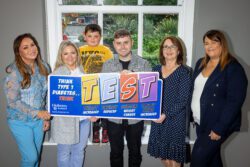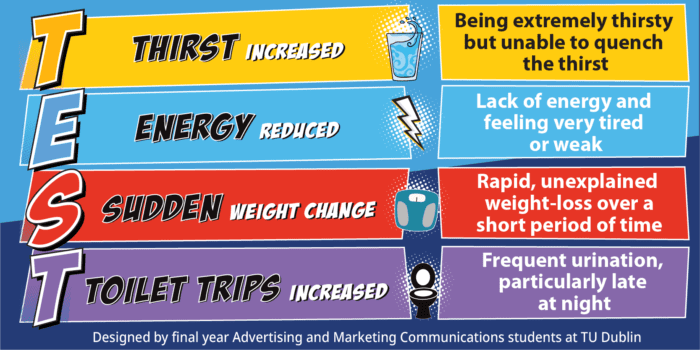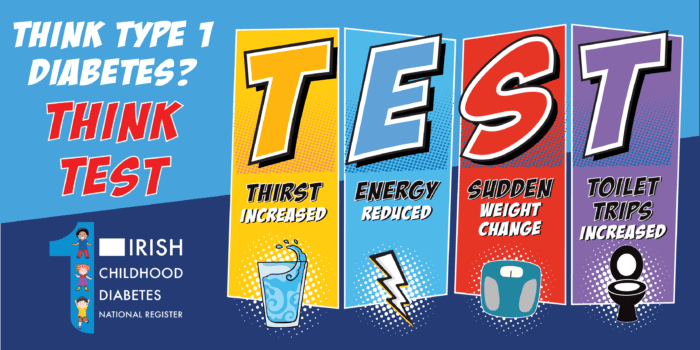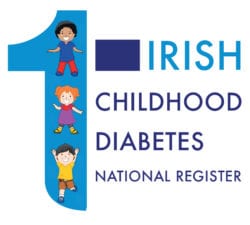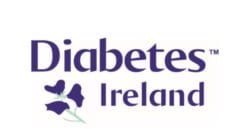TEST…… know what it stands for, recognise the symptoms, and treat early as time is critical in a diagnosis of Type 1 diabetes
A new collaborative campaign between Diabetes Ireland and the Irish Childhood Diabetes National Register, supported by Norah Casey, Professor Edna Roche, Consultant Paediatrician and Endocrinologist alongside diabetes advocates Eva Lee and her son Danny and Jay Hickey aims to raise awareness among the general public about the symptoms of Type 1 diabetes, equipping individuals to recognise these signs early, seek help and avoid the development of Diabetic Ketoacidosis (DKA).
A delay in the diagnosis of Type 1 diabetes can quickly lead to a life-threatening complication called Diabetic Ketoacidosis or in short DKA. Early recognition of the symptoms and early treatment can prevent the development of DKA.
Type 1 diabetes can affect individuals of all ages. It is estimated that around 0.6% of the Irish population (30,895 people) are diagnosed with Type 1 diabetes with numerous adults receiving Type 1 diabetes diagnosis each month.
A very high proportion of children present with DKA at the time of diagnosis of their diabetes with 43% or more than 4 in 10 children having DKA at the time of Diabetes diagnosis and this number has been increasing since 2016. Children in Ireland have the 10th highest reported incidence of Type 1 diabetes in the world.
The rate of new-onset type 1 diabetes in Irish children and young people is 37.6 cases/100,000/year which is very high. In the period 2019 to 2021, the rate has increased by 21% (or 10% per annum). On average 7 children and teenagers are diagnosed each week with Type 1 diabetes in Ireland.
Delays in the diagnosis of adults with Type 1 diabetes are an ongoing problem in Ireland. In a recent Diabetes Ireland survey on “Experiencing, Accessing and Using Diabetes Health Services by people with diabetes” 41% of adults living with Type 1 diabetes reported having DKA at the time of diagnosis. Unfortunately, Type 1 diabetes is sometimes not considered as a primary diagnosis when symptoms first appear in adults.
Delays in diagnosis can happen because the symptoms of Type 1 diabetes are subtle.
We all need to know the symptoms of Type 1 diabetes so we can recognise them early and take action. The symptoms are the key indicators that you or your child might have Type 1 diabetes.
TEST which is easy to remember as an acronym represents the symptoms of Type 1 diabetes.
Think of TEST and do not delay!
- Take a TEST – contact your GP or local pharmacist.
- Take a TEST – ask for a simple finger prick blood glucose test (or bring a urine sample) which will greatly help make the diagnosis of Type 1 diabetes in a person feeling unwell.
If the test is positive, e.g. blood sugar over 11 mmol/l, you will need to go to your local hospital Emergency Department for early assessment and treatment.
Acting fast has great benefits – it will enable earlier diagnosis and treatment and can avoid the development of DKA. Avoiding DKA can make the initial treatment much easier for children and their families and has short and long-term benefits.
If you or your child has diabetes, don’t worry, while a diagnosis of Type 1 diabetes is a life-long condition, there are thousands of Irish people and indeed worldwide with Type 1 diabetes living their lives to the full each day.
Type 1 diabetes occurs because the body stops producing the hormone Insulin which enables the body to use glucose (sugar) as fuel. As a result, in untreated diabetes, the level of glucose in the body gets too high. If your child has these symptoms below it is important that you seek urgent medical help. Early diagnosis improves the long-term outcome of diabetes. Late diagnosis can result in life-threatening Diabetic Ketoacidosis (DKA).
There are 4 main symptoms to watch out for;
The symptoms of Type 1 diabetes in children can be easily remembered by thinking of the word TEST:
- Thirst Increased
- Energy Reduced
- Sudden reduction in Weight
- Toilets Trips Increased
Minor Symptoms may include:
- Increased Appetite
- Lack of Concentration
- Bed Wetting
- Constipation
- Mood Swings
- Frequent Infections
If you think you or your child could have Type 1 diabetes, do not delay, contact your doctor or pharmacist urgently.
Many ordinary people achieve extraordinary things every day while living with Type 1 diabetes. Diabetes does not stop them… they are ONESTOPPABLE
Eva and her Son Danny Living with Type 1 Diabetes
Danny had just turned four when he was diagnosed with type 1 diabetes, Eva recalls he was extremely hungry and thirsty and was getting up at night. Danny was brought to the GP, where a finger prick test revealed very high blood glucose levels and referred to the hospital. Now six years of age, Danny is adapting well to life with Type 1 diabetes.
Jay Living with Type 1 Diabetes
Jay was diagnosed with Type 1 diabetes at the age of 10, and he adapted well to the condition. However, as he got older, he began to struggle with it, resulting in him neglecting his management, which eventually led to him developing the stomach condition, gastroparesis. Now aged 30, Jay from Dublin marked 20 years of living with diabetes in December.
Leah Living with Type 1 Diabetes
Catherine Five Times World Champion Kickboxer Living with Type 1 Diabetes
Ciara Parent of a Type 1 Child with DKA
Click here to Read THINK Diabetes Timely Detection
Professor Edna Roche discusses the importance of early detection of type 1 diabetes in young children and teenagers.
Professor Edna Roche, Consultant Paediatrician and Endocrinologist
What is DKA
What is Diabetic Ketoacidosis (DKA) and does everyone diagnosed with diabetes get DKA?
In type 1 diabetes the body stops producing insulin. Insulin is the hormone produced by the pancreas to enable glucose or sugar from food to enter the body’s cells to be used as fuel. When the body stops making insulin, the glucose from food cannot be used and levels of glucose build up in the blood. The body responds to these high blood sugar levels by excreting the extra glucose in the urine leading to the key symptoms of diabetes – passing large amounts of urine frequently resulting in dehydration and increased thirst. Diabetes can be diagnosed at this stage.
However, if the diagnosis is delayed and symptoms persist the body increasingly depends on a backup fuel supply and breaks down fat excessively to form acidic ketone bodies. These ketones build up in the body changing the body’s acidity and resulting in the life-threatening condition of diabetic ketoacidosis. Diabetic ketoacidosis (DKA) is an avoidable complication of diabetes. DKA can be avoided by starting treatment and replacing the missing insulin.
The majority of children diagnosed with Type 1 diabetes do not have DKA at diagnosis and are diagnosed because of high blood sugar levels. However, a worrying proportion of our children and adolescents, more than 1 in every 4, have progressed to DKA at the time of their diagnosis.
The purpose of this campaign is to reduce the number of Irish children presenting with DKA by increasing awareness of the symptoms of T1D and encouraging early diagnosis.
Our goal is to reach at least 1 million people in Ireland, and we need your support today! Together we can make a difference
How Can You Help?
Follow us on our social media channels, like and share our message with your family and friends “Think Type 1 Diabetes, Think TEST… Thirst, Energy, Sudden, & Toilet Trips… Many ordinary people achieve extraordinary things every day while living with Type 1 diabetes. Diabetes does not stop them …. they are #ONESTOPPABLE”
Follow us on Instagram, Twitter, Facebook & LinkedIn
Download the poster and place it on a school, GP, Post Office, Library, or Shop Notice Board.
Click here to download the poster
Download the leaflet and share it with family and friends. #Onestoppable and read some of the extraordinary achievements of young people with Type 1 diabetes.
Click here to download the leaflet
Campaign led by the ICDNR and Supported by Diabetes Ireland and Novo Nordisk



